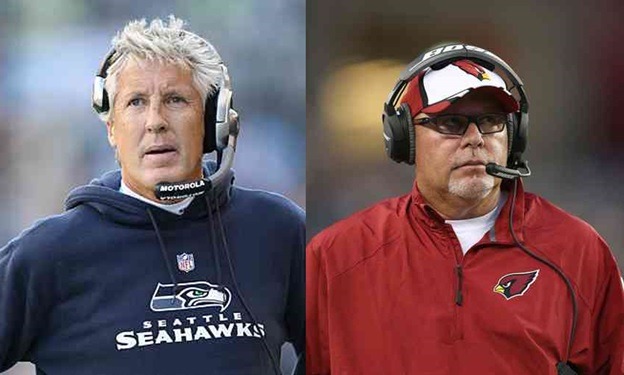
You know where you can find Bill Jacobs on any given Sunday – he’s on the couch, watching the full array of NFL games. This past Sunday, he was treated to many different head-to-head matchups, but none more impactful than the late game between the Cardinals and Seahawks.
While most of the time, the attention is on the 22 players on the field, in today’s post, Bill takes a look at the two coaches on the sidelines. Because while the game wore on, the story within the story was about coaches Pete Carroll and Bruce Arians, and their very different reactions to an extremely frustrating game. Sports is a metaphor for business, and that was especially true on Sunday night. – FJ
 Football remains the most watched sport in the U.S., but it’s been hard not to notice the steep decline in ratings in 2016 so far. There’s a lot of speculation why – from the election to Colin Kaepernick to just plain oversaturation – and possibly, a lack of stars and marquee matchups.
Football remains the most watched sport in the U.S., but it’s been hard not to notice the steep decline in ratings in 2016 so far. There’s a lot of speculation why – from the election to Colin Kaepernick to just plain oversaturation – and possibly, a lack of stars and marquee matchups.
This past Sunday night summed it all up. In what should have been an entertaining battle between two powerhouses – teams with a shot at the Super Bowl – the outcome couldn’t have been more tedious and boring. And that capped a day of football that began with an interception filled game at 9:30ET time between the Rams and Giants in London, England.
If you were unfortunate enough to watch the Sunday night game between the Arizona Cardinals and the Seattle Seahawks, what you saw was dreadful. At the end of regulation, the two teams were deadlocked at the dismal score of 3-3, sending it into (oh no!) overtime. And to make matters worse, the game ended up in a rousing 6-6 tie, the lowest scoring tie in the overtime era of the NFL.
But wait – there’s more. Each team had a chance to win this pathetic game with very easy field goals in overtime. Arizona had a shot with 3:26 left in OT but their kicker, Chandler Catanzaro, muffed a 24-yard field goal. And then in the final seconds, Seattle kicker Steven Hauschka blew a 28-yard field goal. And that’s how an already brutal game ended in a bitter, disappointing ending for both teams (and it won’t do a thing to help the NFL’s lagging ratings).
You can watch all the pain unfold in this video.
But the real story is how each of the coaches reacted to this horrifying ending and how they dealt with their kickers’ mistakes. Inc’s Justin Bariso called it “A Lesson In Leadership,” and it has reverberations for all of us in management positions.
First, here’s the recap from an angry Arizona Cardinals coach Bruce Arians with his reaction to his kicker’s botched effort:
“Make it. This is professional, this ain’t high school, baby. You get paid to make it.”
Now contrast that scathing quote with how uber-cool Seattle coach Pete Carroll reacted to a sure victory evaporating because of an astonishing miss:
“(Hauschka) made his kicks to give us a chance and unfortunately didn’t make the last one. He’s been making kicks for years around here…but he’s gonna hit a lot of winners as we go down the road here. I love him and he’s our guy.”
Night? Meet day. Now there’s something to be said for “tough love” and simply doing our jobs. But these two responses from NFL team leaders couldn’t be more bipolar. Arians is a well-respected coach trying to get the most out of his players, but his “attack mode” is a major contrast to Carroll’s inclusive team approach. It’s probably one of the reasons Carroll has been voted the most popular coach by NFL players when asked “Which head coach would you most like to play for?”

In any business, the rank and file takes its cues from the person at the top. It’s easy to come off as a great manager when you’re winning big games. But how you respond during the truly tough and trying times defines your leadership.
Using mistakes as a way to truly coach, while not denigrating a failed employee, sends a message to every person in the organization about style and expectations. Setting the tone that the goal is excellence is easier to achieve in a positive and nurturing environment. Here’s what ex-Seahawks player Heath Farwell said about Carroll in an ESPN interview back in 2014:
“If you make a mistake, he uses that as a teachable moment. Pete explains what you did wrong and how you can correct. If you do something wrong, he will say that’s not acceptable by the organization and explain why. We all make mistakes, but with Pete, it’s about learning from it. He’s not a talk-down-to-you or yell-at-you kind of coach.”
NFL players are well-paid professionals. But pretty much everyone around the league knows the coaches you just want to play a little harder for, as well as those who simply fail to inspire greatness.
In that sense, an NFL team isn’t that much different from a radio station, and some of us have been a part of organizations where leadership was lacking from the corner office or the programming or sales departments. Though weak leadership manifests itself in a variety of ways, the great ones have a vision, create and nurture a culture, refuse to play favorites, set goals, teach sound “blocking and tackling,” encourage a strong work ethic, and demand effort and greatness. And all of that can be achieved without snark, without anger, and without put downs. As Carroll – who has won a Super Bowl – said:
“We’re doing it with standards and expectations that are as high as you can get. I’m glad we’ve found a way to do it that guys appreciate it.”
It’s not getting easier in radio – fewer employees, more multi-tasking, lots of pressure – but for those of you fortunate enough to work for great leaders, it’s still the business you’ve known and loved since you first got into it. The demands on success haven’t lessened so the culture a manager creates is more critical as ever.
So it comes down to this: What kind of leader do you want to be? The type who uses negative reinforcement to get the most out of your team, or the manager who considers his/her words carefully and uses positive reinforcement to get the best out of your staff?
In the end, great brands – and winning teams – are shaped by outstanding leadership that nurtures loyalty and a great effort.
Whether the ball sails through the uprights or clangs off the post.
- Leadership Lessons For Radio From The NFL - October 27, 2016




Well said Bill. There’s a lot to be said for coaching/managing in a style that encourages growth, not just performance. As Heath’s quote said, “If you make a mistake, he uses that as a teachable moment.” If the players/talent know what the objective is and why you’re asking something of them, they’re much more likely to make better decisions. The days of “Because I said so,” and people blindly following are long gone. When everyone knows the goal/objective, it’s easier to guide them to the course they should be taking.
Thanks Chris — appreciate the feedback and the insight.
Great points!
I am curious if some additional information will change your take or maybe you can explain further. The Cardinals have had issues with their field goals all season. In this game their kicker had a field goal blocked and missed another. This season he is 8-11. On the other hand Steven Hauschka has been pretty good all season he is 12-14 and is very consistent. So if you have had struggles with a person and you still can’t seem to get the best out of them, what do you do?
Thanks for taking the time to comment – that’s a great question and no doubt he has struggled this year. That said, it’s one thing to be called out in a private meeting or even in a team meeting. It’s another to be called out on national television. Perhaps that technique will work and is just what he needs, only time will tell. But it probably would have been better to sound non-committal or neutral in front of the cameras and then simply cut him if they feel like there’s nothing more than can do to help him.
Greenwood —
I’d say eventually you may have to cut ties with player who is just not cutting it. Do you have to yell and scream or could you simply sit them down, explain the issues and why it’s not working out in that situation. I get the frustration especially when a kick is missed and you don’ pull out the win. Conversely, what about the offense that couldn’t score a touchdown all day. That’s their job too.
You create positive, winning environments that retain people because they are great places to work and suddenly there is a lot less losing going on.
— Prospector
I tend to agree with you Prospector – “you win as a team, you lose as a team.” Thanks for the comment.
When I read this I couldn’t help but remember a couple of radio jobs where the PD used terror and anger to motivate. How different those jobs could have been with more kind words and showing the staff a path to excellence rather than the path to the door.
No doubt, Dan. In the vast majority of cases, vitriol is simply not going to be effective. Leadership comes in my forms, but that kind of approach is typically destined to fail. Thanks for the feedback.